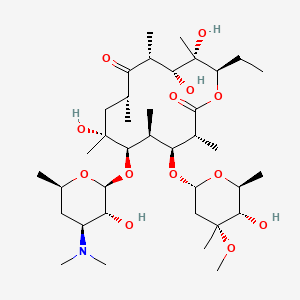erythromycin
erythromycin is a lipid of Polyketides (PK) class. Erythromycin is associated with abnormalities such as Systemic Inflammatory Response Syndrome, Pneumonia, Infection, Pneumococcal Infections and Exanthema. The involved functions are known as Pharmacodynamics, Sterility, Agent, Drug Kinetics and Adjudication. Erythromycin often locates in Blood, peritoneal, Extracellular, Ribosomes and apicoplast. The associated genes with erythromycin are P4HTM gene, SLC33A1 gene, FAM3B gene, Operon and Homologous Gene. The related lipids are Hydroxytestosterones, Steroids, Propionate, Mycolic Acids and campesterol. The related experimental models are Mouse Model and Knock-out.
Cross Reference
Introduction
To understand associated biological information of erythromycin, we collected biological information of abnormalities, associated pathways, cellular/molecular locations, biological functions, related genes/proteins, lipids and common seen animal/experimental models with organized paragraphs from literatures.
What diseases are associated with erythromycin?
erythromycin is suspected in Pneumonia, Infection, Gonorrhea, Cystic Fibrosis, Respiratory Tract Infections, Influenza and other diseases in descending order of the highest number of associated sentences.
Related references are mostly published in these journals:
- Antimicrob. Agents Chemother. (35)
- J. Antimicrob. Chemother. (18)
- J. Pharmacol. Exp. Ther. (2)
- Others (29)
| Disease | Cross reference | Weighted score | Related literature |
|---|
Possible diseases from mapped MeSH terms on references
We collected disease MeSH terms mapped to the references associated with erythromycin
PubChem Associated disorders and diseases
What pathways are associated with erythromycin
There are no associated biomedical information in the current reference collection.
PubChem Biomolecular Interactions and Pathways
Link to PubChem Biomolecular Interactions and PathwaysWhat cellular locations are associated with erythromycin?
Visualization in cellular structure
Associated locations are in red color. Not associated locations are in black.
Related references are published most in these journals:
| Location | Cross reference | Weighted score | Related literatures |
|---|
What functions are associated with erythromycin?
Related references are published most in these journals:
| Function | Cross reference | Weighted score | Related literatures |
|---|
What lipids are associated with erythromycin?
Related references are published most in these journals:
| Lipid concept | Cross reference | Weighted score | Related literatures |
|---|
What genes are associated with erythromycin?
Related references are published most in these journals:
- Antimicrob. Agents Chemother. (19)
- J. Antimicrob. Chemother. (10)
- Drug Metab. Dispos. (5)
- Others (29)
| Gene | Cross reference | Weighted score | Related literatures |
|---|
What common seen animal models are associated with erythromycin?
Mouse Model
Mouse Model are used in the study 'In vitro and in vivo activities of macrolide derivatives against Mycobacterium tuberculosis.' (Falzari K et al., 2005) and Mouse Model are used in the study 'Activity of ABT-773 against Mycobacterium avium complex in the beige mouse model.' (Cynamon MH et al., 2000).
Knock-out
Knock-out are used in the study 'Functional expression and comparative characterization of nine murine cytochromes P450 by fluorescent inhibition screening.' (McLaughlin LA et al., 2008).
Related references are published most in these journals:
| Model | Cross reference | Weighted score | Related literatures |
|---|
NCBI Entrez Crosslinks
All references with erythromycin
Download all related citations| Authors | Title | Published | Journal | PubMed Link |
|---|---|---|---|---|
| Belkengren R and Sapala S | Pediatric management problems. Left corneal abrasion. | 1998 Jul-Aug | Pediatr Nurs | pmid:9849269 |
| Yamazaki H and Shimada T | Formation in vitro of an inhibitory cytochrome P450 x Fe2+-metabolite complex with roxithromycin and its decladinosyl, O-dealkyl and N-demethyl metabolites in rat liver microsomes. | 1998 | Xenobiotica | pmid:9849646 |
| Roy SK et al. | A randomized clinical trial to compare the efficacy of erythromycin, ampicillin and tetracycline for the treatment of cholera in children. | 1998 Jul-Aug | Trans. R. Soc. Trop. Med. Hyg. | pmid:9850410 |
| Hsueh PR et al. | Dissemination of high-level penicillin-, extended-spectrum cephalosporin-, and erythromycin-resistant Streptococcus pneumoniae clones in Taiwan. | 1999 | J. Clin. Microbiol. | pmid:9854097 |
| Weissman KJ et al. | Evaluating precursor-directed biosynthesis towards novel erythromycins through in vitro studies on a bimodular polyketide synthase. | 1998 | Chem. Biol. | pmid:9862800 |
| Unge J et al. | The crystal structure of ribosomal protein L22 from Thermus thermophilus: insights into the mechanism of erythromycin resistance. | 1998 | Structure | pmid:9862810 |
| Coulie B et al. | Involvement of two different pathways in the motor effects of erythromycin on the gastric antrum in humans. | 1998 | Gut | pmid:9863486 |
| Delaforge M | Importance of metabolism in pharmacological studies: possible in vitro predictability. | 1998 | Nucl. Med. Biol. | pmid:9863553 |
| Toyota K | Pyloric opening and closure evaluated by means of strain gauge force transducers. | 1998 | J Smooth Muscle Res | pmid:9866113 |
| Wald ER | Sinusitis. | 1998 | Pediatr Ann | pmid:9866138 |
